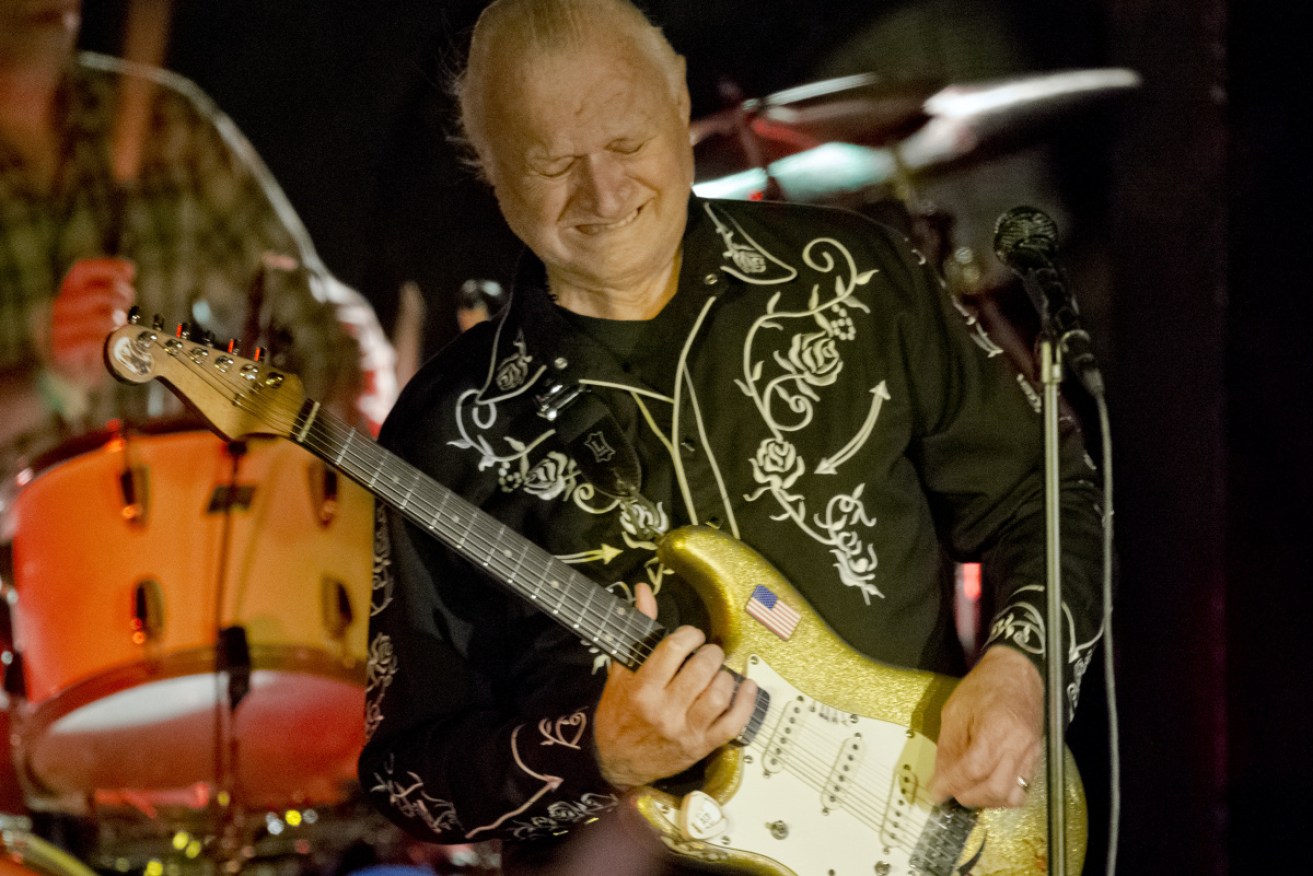King of surf guitar Dick Dale catches his last wave

Dick Dale performing in Barcelona in 2010. Photo: Getty
Dick Dale, the ‘King of the Surf Guitar’ who formulated the sound and attack of the Southern California-bred instrumental style in the early 1960s, has died. He was 81.
In his The Illustrated Discography of Surf Music, writer and latter-day surf guitarist John Blair described the genesis of Dale’s distinctive and unprecedented sound.
“He attempted to musically reproduce the feeling he had while surfing, and the result of this somewhat nebulous and certainly subjective approach was the surfing music genre,” Blair wrote.
The feeling was one of vibration and pulsification, which he produced by a heavy staccato sound on the low-key strings of his guitar accompanied by a heavy thunder-like beat.”
Southpaw player Dale acknowledged the impact of guitar and amplifier manufacturer Leo Fender and his designer Freddie Tavares’ equipment on his sound.
Fender built the first left-handed edition of his solid-body Stratocaster model guitar to Dale’s specifications.
The musician, who had codified his instrumental approach on the 1961 single Let’s Go Trippin’, further refined the surf style by applying Fender’s outboard reverb unit on his trend-setting 1962 single Miserlou.
Dale was never a huge record seller but his packed live shows inspired dozens of local teens to start their own instrumental surf combos.
Dale’s career went into eclipse as the British invasion pushed the surf sound to the side, and health problems pushed him into retirement in the late ’60s.
He made periodic returns to the spotlight. In 1994, amid a nationwide resurgence of interest in instrumental surf music, Miserlou was famously used as the title music for Quentin Tarantino’s feature Pulp Fiction.
His subsequent independent label releases and touring brought his pioneering style to a new generation of listeners and players.
He was born Richard Anthony Monsour on May 4, 1937 in Boston. His father, Jim, was Lebanese, and as a boy he played the Middle Eastern tarabaki drums at local community festivals. As a boy he played trumpet and ukulele.
He began playing guitar in emulation of his idol, country star Hank Williams.
At 17, he moved with his family to El Segundo, California. He worked at Hughes Aircraft after graduating from high school. At the urging of his father, he began to compete in local country music talent shows. He credited local DJ T Texas Tiny with suggesting the stage name Dick Dale.
By early 1961, Dale had moved to the Balboa Peninsula south of Los Angeles, where he opened a record store, gave guitar lessons, played small gigs in a local ice cream parlour and, fatefully, began to surf.
Assembling a band of like-minded locals, the Deltones, he began playing at the Rendezvous, a derelict big-band venue, in July 1961.
Dale’s “stomps” (dances) at the Rendezvous were soon drawing thousands, and many in his audience were members of the local surfing community.
With its titular invitation to ride the surf, Let’s Go Trippin’ became a regional and then a national hit in late 1961.
By 1962, Dale had added Fender’s reverb unit to his arsenal, and he employed it to staggering effect on Miserlou, a traditional song of Egyptian origin that had been a notable hit for Lebanese musician Clovis el-Hajj in 1944.
Dale released four studio albums and a live set on Capitol from 1963-65.
The LPs spawned such classic surf instrumentals as The Wedge, Hava Nagila (a rocking rearrangement of the Israeli folk song), Night Rider and Banzai Washout, and the self-celebrating King of the Surf Guitar.
Instrumental surf music was decidedly out of fashion by the time Dale’s final Capitol album, a live set captured at Ciro’s on the Sunset Strip, was issued in March 1965.
The revival of Dale’s career began in earnest in the early 1990s, just as dozens of post-punk surf bands began to explore the sound he had pioneered.
He recorded a pair of albums, Tribal Thunder (1993) and Unknown Territory (1994), for the Northern California independent label Hightone Records. His last new studio album, the self-released Spacial Disorientation, was issued in 2001.
-AAP








